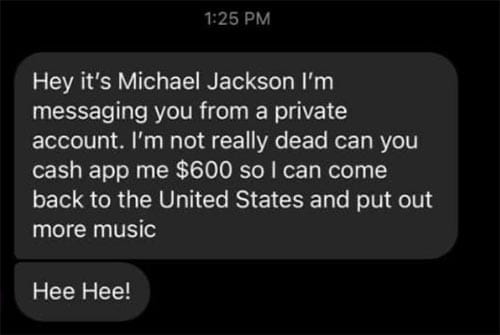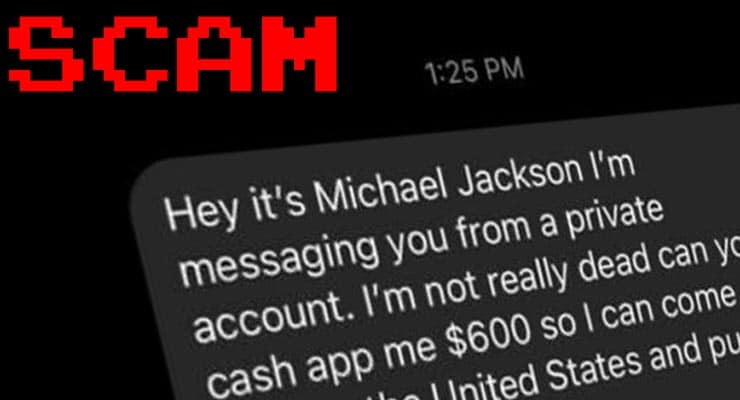Audacious scam as crooks pretend to be Michael Jackson
There are sinister scams. Then there are silly scams. And finally there are entirely nonsensical scams bordering on absurdity. And when crooks think they can scam money from a victim by pretending to be not-so-dead-after-all Michael Jackson, you know you’re probably seeing the latter.
In July 2021 and August 2021, social media users on Instagram began reporting receiving direct messages from a number of Instagram accounts apparently belonging to Michael Jackson, the singer who passed away in 2009.
And while it may be quite a surprise to receive a message from one of the most famous singers in the world, especially since he died over a decade ago, it must have also been a shock to see that he’s asking the recipient for money as well.
According to the messages (below), Jackson needs $600 to get himself back to the United States and making more music.

Hey it’s Michael Jackson I’m messaging you from a private account. I’m not really dead can you cashapp me $600 so I can come back to the United States and out out more music.
Hee hee.
The above is just one of a series of bizarre messages whereby we can only assume that the cybercriminals are really just chancing their luck, since the success rate of these schemes must be catastrophically small. Other similar messages that have also been posted include one from Beyonce who apparently needs money for gas so she can make her way to a concert “in your city”.
Sponsored Content. Continued below...
Sure thing. But the reality is that if crooks can send these messages out to enough potential victims, someone will sure enough take the bait and bite. It’s why we call these sorts of scams phishing scams.
Needless to say, the scam really is as simple as you’d think. Any money send to these crooks via the Cashapp is stolen. And those who send out payments will more than likely be contacted again to send more money.
And believe it or not, there is a certain logic to sending out nonsensical scams en masse, as we discuss here.
While these messages represent the more audacious and ridiculous end of the phishing spectrum, we have seen plenty of other similar (and slightly more convincing) celebrity phishing scams whereby victims are contacted by “celebrities” over the Internet with the endgame being to lure the victim into parting with their own money.
We know most of our regular readers will never actually need to be told this, but seriously, never send money to a “celebrity” over the Internet. Because if they’re asking for money, it’s not really a celebrity. It’s a scammer impersonating one.
And that advice is especially true if that celebrity died over a decade ago.
Continued below...
Thanks for reading, we hope this article helped, but before you leave us for greener pastures, please help us out.
We're hoping to be totally ad-free by 2025 - after all, no one likes online adverts, and all they do is get in the way and slow everything down. But of course we still have fees and costs to pay, so please, please consider becoming a Facebook supporter! It costs only 0.99p (~$1.30) a month (you can stop at any time) and ensures we can still keep posting Cybersecurity themed content to help keep our communities safe and scam-free. You can subscribe here
Remember, we're active on social media - so follow us on Facebook, Bluesky, Instagram and X
